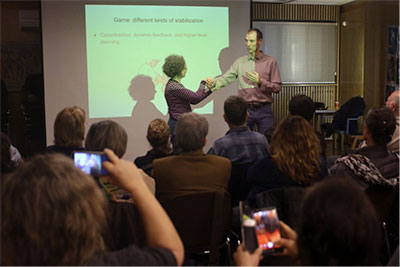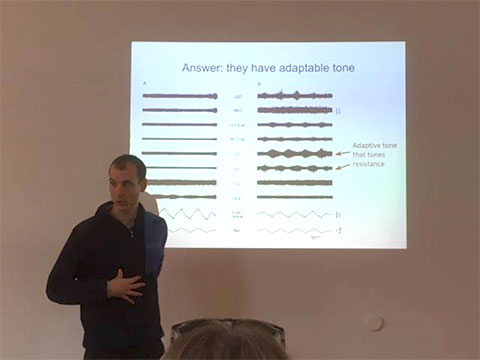Date/Time
Date(s) - Sat, 4th Nov 2017 - Sun, 5th Nov 2017
10:00 AM till 5:00 PM
Location
Alexander Technique Centre
 or iCal or RSS
or iCal or RSS Workshop with Patrick Johnson and Tim Cacciatore (via webcam).
Workshop 1: Reflexes and faulty sensory appreciation. Saturday 4 November 10 am – 1 pm.
Workshop 2: Posture, Movement, and Balance. Saturday 4 November 2 pm – 5 pm.
Workshop 3: Body schema, Inhibition, Stress, and Emotions. Sunday 5 November 10 am – 1 pm.
Workshop 4: Describing how it all works. Sunday 5 November 2 pm – 5 pm.
Content/Overview
What is going on when you practice Alexander Technique? We have all sorts of experiences, observations, and sensations. Can these phenomena be described and explained objectively?
Since F. M. Alexander first referenced the work of Rudolf Magnus in the 1920s, AT has borrowed ideas from science to explain AT experiences. Scientific concepts permeate the AT culture – books, websites, lectures, conversations – with many references to concepts such as reflexes, gravity, startle, effort, tensegrity and spatial awareness to name a few.
In general, however, most of the science we use is either out of date or very roughly applied. Furthermore, it is only in the last decade or two that we have seen high quality modern science applied directly to AT and AT mechanisms.
The goal of these workshops is to confront our current relationship with science and to get our scientific explanations and concepts up-to-date. We combine lectures, group activities, and discussion to identify and debunk misconceptions and to build new, current models that support what we do and how we communicate. We emphasize rigor, jargon-free communication, and reference to current experiments.
Format
Workshops 1 and 2 will cover material we discussed last year in our visit to London, including such topics and reflexes, postural support, and faulty sensory appreciation. These will be useful for people who missed that seminar or who want to review and revisit those topics in more detail. Workshops 3 and 4 are entirely new material covering body schema, inhibition, postural effects on emotions, hands on communication, natural movement, tensegrity, how tonic effects spread throughout the body. Workshop 4 focuses on combining a variety of topics into a unified description.
About us, about these workshops
Dr. Johnson is a PhD. physicist and a practicing STAT/NeVLAT certified teacher of the Alexander technique with over 15 years of research experience and 7 years of AT teaching experience. Dr. Cacciatore is a PhD. Neuroscientist and STAT certified teacher, author of many peer reviewed scientific articles on Alexander technique, with 20 years of research experience.
We have been giving these workshops for almost two years now, in Ireland, Spain, England, Israel, The Netherlands, Brazil, Argentina, Mexico, and the USA for both AT teachers and teachers in training. Our initial goal was to communicate rigorous science of Alexander Technique in ways that are accessible and fun. The workshops have since grown in both content and scope, are are now part of a broader dialogue about how to think objectively, scientifically, and professionally about what we do. We are excited about the enthusiasm and content they have generated.
Workshop 1: Reflexes and faulty sensory appreciation
Topics:
● Outdated ideas in the AT world: Magnus, the stretch reflex, the righting reflex, “natural movement”
● Postural tone: what is it? Why should AT teachers know about it?
● Experiments on postural tone: “Twister” and the Kohnstamm effect
● Faulty sensory appreciation: what does current science have to say about it?
Activities:
● The Rubber hand illusion
● Pushing the hand against the wall (the Kohnstamm effect)
● Tuning reflexes with hand slapping
Workshop 2: Posture, Movement, and Balance
Topics:
● Posture: is it a good or bad word for AT teachers?
● Understanding how the scientific definitions of postural support, goal directed movement, and balance explains a lot of what AT is about.
● Why do students lurch? Experiments on the interference of posture on movement in sit-to-stand
● The physics of getting up from a chair: what you need to know as a teacher
Activities:
● Playing with different ways to get out of a chair
● Experiencing different stabilization strategies
Workshop 3: Body schema, Inhibition, Stress, and Emotions
Topics:
1. Body schema: How does our internal representation of ourself define not only our own use but how we interact with the world? Can it be altered? Is this really the heart of AT?
2. Inhibition: How do different AT teachers talk about inhibition? How do scientists talk about inhibition? What is the overlap?
3. AT and stress (and startle): Some claim that AT as calming an overactive startle pattern and/or reducing stress. Is there science to support this? Are we using the right terminology?
4. Posture and emotions: Science has a lot more to say about how posture affects everything from emotions to decision making than it did 20 years ago. AT teachers should be up to date on this!
Activities:
1. Thinking, feeling and learning with your body schema.
2. Take some scientific inhibition challenges: the Stroop test and more
3. Games with changing postural patterns
Workshop 4: Describing how it all works
Topics:
● Talking about AT without jargon
● AT terminology: Direction, Use, and Primary Control
● Thinking affects use. Experiments of Dr. Rajal Cohen and more.
● “Natural” coordination patterns – do they exist? What do we mean when we talk about “natural” movement? What does science have to say about this?
● “Springy” backs and delocalized tone – mechanical and neurological spreading effects and debunking tensegrity
● Improved sensory appreciation – what kinds of changes happen and what skills are learned?
● How can a local change affect global patterns? Experiment of Dr. Ian Loram and more.
● How might subtle “hands on” effects work? What kind of messages can be sent via contact?
Activities:
● Describing AT effects without jargon – is it possible?
● Sensing stability – how good is our touch?

